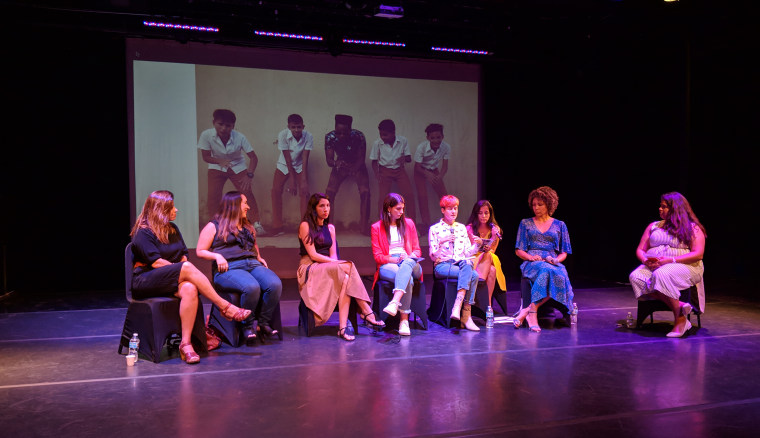MIAMI — For Cuba’s rising creative class, standing at the crossroads of art and commerce, the devolving relationship between the United States and Cuba has been especially problematic.
This was the takeaway from Cuban and Cuban-American female entrepreneurs at a recent panel in Miami. The Creativas 2 conference was hosted by the Havana-based HAPE Collective, CubaOne and Cuba Educational Travel, organizations that have sought to create connections between people in the U.S. and Cuba.
"It’s a unique moment in Cuba — the diplomatic opening between our two countries led to a rapid expansion of the private sector, especially in areas of tourism,” said Cherie Cancio, founder of Cuba One. “While the latest announcements have deflated the tourism sector, creatives are filling the void.”
Cancio was referring to new sanctions on remittances and travel to Cuba announced recently by the Trump administration, rolling back some of the gains made under the Obama administration's overtures to the Caribbean island.
One of the "creatives" Cancio was talking about is Lauren Fajardo, 35, co-founder of Dador, a sustainable lifestyle brand of clothing and an art project based in Havana.
“It’s really hard to start a business anywhere in the world," said Fajardo, "but when you have different sides pulling their own way, you don’t know where to grab onto.”
Though Fajardo studied design in Cuba, there was no fashion industry when she graduated outside of making uniforms. She become a costume designer for stage and film instead. When opportunities for private businesses opened up, Fajardo launched Dador with her college friends Ilse Anton and Raquel Janero, moving quickly once they were able to get internet access from their phones in 2016.
“What people need to understand is that entrepreneurship in Cuba is very new because we have no precedent,” Fajardo said from the stage. “When we started to build our business, we realized that the business plan that we aspired to was not there, so we had to make it.”
Their workshop and retail space in Old Havana focuses on entirely Cuban-made garments.
Now, the worry is that restrictions on travel visas will limit their ability to access needed supplies and develop a customer base in the United States.
While the current situation is worrisome, Fajardo said Cubans like her are making it work.
“What’s keeping our heads above water is that we’re a growing community of entrepreneurs and we are willing to support and stick together to go forward and continue this path,” she said.
It’s a path Cristina Figueroa, 35, of Studio Figueroa-Vives knows well. Her family has self-financed their studio-gallery space promoting Cuban art and culture since the 1990s, long before private business licenses were allowed. They still operate in a gray area, one in which Figueroa says they are still committing “the original sin” of remaining independent.
“We’ve always lived in a very complex situation. It’s not like we’ve ever relaxed,” explains Figueroa. “The new policies will affect us, that’s true, but that won’t stop us from creating. We will keep going, we will keep creating, because we’ve always been fighting against all odds.”
May Reguera, 28, a self-taught photographer, doesn’t officially exist as an artist though she’s frequently published in independent magazines and exhibits her work both inside Cuba and abroad. Because there is no academy for still photography in Cuba, Reguera could not be part of the official registry of artists, so she obtained a license to be a cuentapropista, or independent business owner, instead.
“Without a title that validates my profession, what legalizes my studio is my permit to be self-employed, which allows me to work, but doesn’t represent me as a creative or an artist,” Reguera said.
Because official galleries couldn’t show her work, she turned to social media platforms where clients and independent gallerists found her. She is currently participating in this year’s Havana Biennial. Though she’s not expecting that the U.S. policy changes will hinder her creative life, sourcing equipment will be more difficult.
“I buy everything in the United States, and that’s going to be a problem,” says Reguera.
It’s the uncertainty that Marta Deus, 31, a financial consultant and founder of Negolution, an online magazine covering Cuba’s private sector, is picking up from her clients, many of whom rely on remittances — the money that Cubans in the U.S. send back home to relatives — to keep their businesses going. She uses this money for everything from payroll to equipment to sourcing wholesale supplies.
Deus says it's also had an effect on investment on the island.
“The people that wanted to invest in doing something in Cuba are saying, 'Let’s wait because we don’t know what will happen,'” Deus said.
The change in U.S. policy comes against a backdrop of some progress for Cuba's small-business owners, who benefited from some changes made by Cuba and the strengthened relations under President Barack Obama.
“In 2010, there were approximately 140,000 licensed entrepreneurs operating in Cuba after Raul Castro legalized the sector. By 2016 there were 535,000 licensed entrepreneurs on the island, largely due to the ease with which Cubans could secure a license at the time,” said Ric Herrero, executive director of the Cuba Study Group, by email. “Obama-era policies also boosted demand for private sector goods and services on the island. In particular, the lifting of travel and remittance restrictions widely expanded access to American customers, capital and resources for Cuban entrepreneurs.”
Despite the reality of their situation in Cuba and the recent U.S. restrictions, the Cuban entrepreneurs visiting Miami said they are forging ahead with their business plans.
“We are representing a generation of people who had the dreams but not the opportunities,” Figueroa said during the panel. “And now we want to show a new generation that those opportunities do exist.”
FOLLOW NBC LATINO ON FACEBOOK, TWITTER AND INSTAGRAM.

